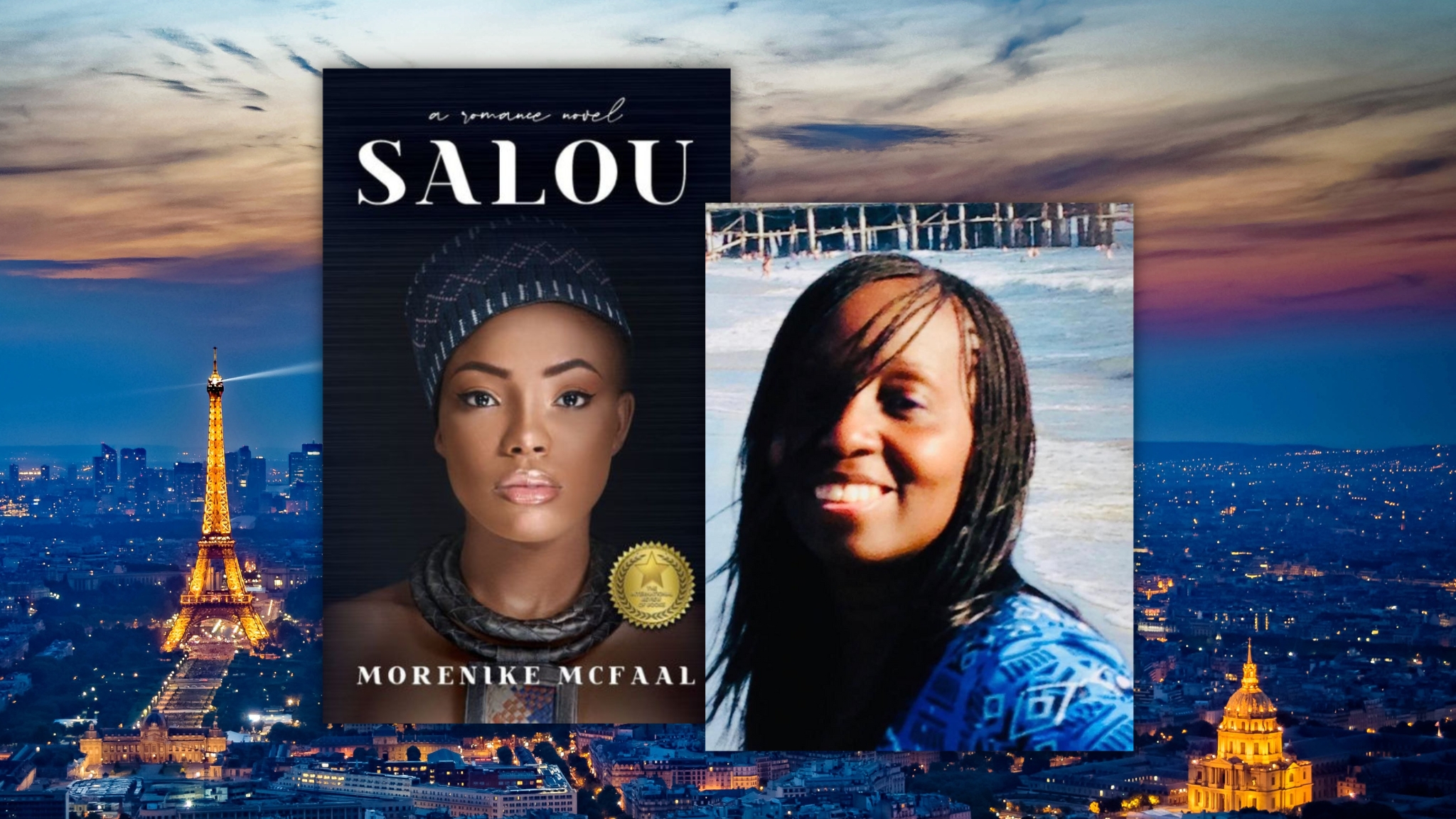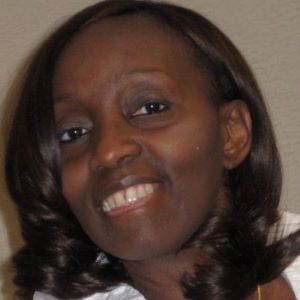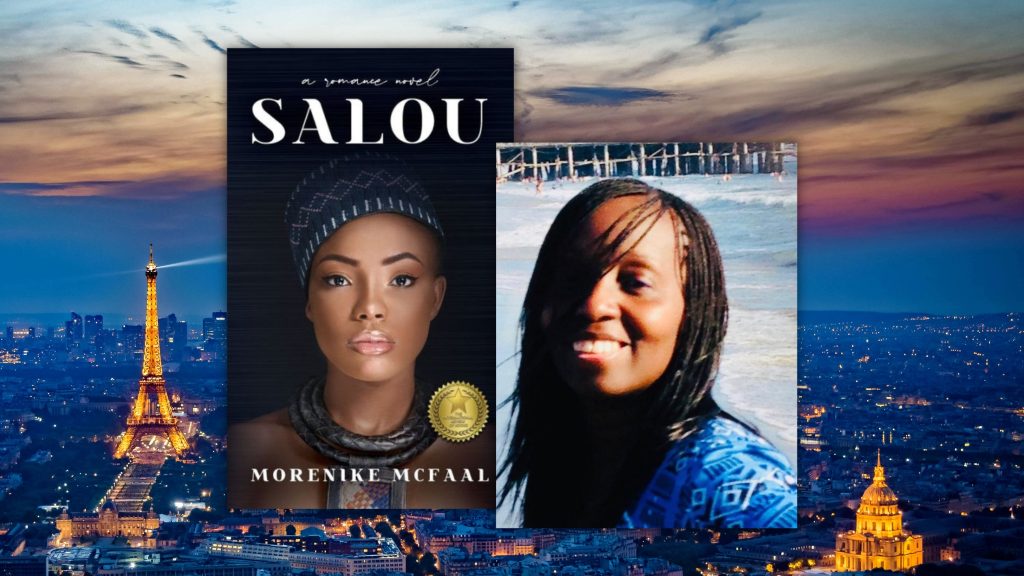
Salou by Morenike McFaal
Doctor Salou Kassai is two years out of the Paris School of Medicine and already runs Necker Hospital ICU’s neonatology unit. But when a debilitating accident strikes, she wakes up nameless in a Paris hospital, robbed of all her memories.
In her debut novel Salou (Palmetto Publishing), author Morenike McFaal crafts a layered story of suspense, intrigue and romance in the face of political turmoil. Incorporating cultures and nations from her own travels, McFaal adds a level of realism to Salou’s sprawling narrative. We had a chance to talk with the author about how her lived experiences influenced the novel, and what she hopes readers will learn from her characters’ adventures.
Q: Your book is described as “genre-defying” and spanning “continents, cultures and time periods.” What inspired you to expand your story past the usual hard limits of genres?
A: I would say that because the story was inspired by true events, the creative process came naturally to me. The story of Salou started many years back when I was still a young girl living with my parents in Yaoundé, Cameroon. Crouched behind the large curtains fencing the bedroom quarters from the living room, I would listen with all the attention of an 8-year-old to the love story of a young French doctor, a colleague of my father, who flew all the way from Paris to his fiancée’s country in Africa, to ask for her hand in marriage. So, five years ago, when I decided to write my first novel, images of this episode of my childhood resurfaced and enticed me to put down on paper this story that captivated me so much.
I witnessed oral accounts of the original events, and they vividly stuck with me, until I decided to write. And then, when I researched genres that could fit Salou, I couldn’t find anything close to it. I knew that this story would go beyond the usual hard limits of genres but welcomed the challenge and embarked on the journey. Not without apprehension — because you do have some when you enter uncharted territory, but with excitement and determination to frame it and make it happen.
Q: What was it like to focus on these previously mentioned continents, cultures and time periods? How much did you have to research, and how much of it was familiar to you?
A: What would be construed as a research process is actually the many years I spent in many countries spanning several continents, first as the daughter of a World Health Organization (WHO) physician, and later as a student and professional conference interpreter who overall visited 46 countries and 4 continents. The knowledge I gained — the cultures I came to discover and embrace, the languages I learned, the settings and landscapes I saw, the cities and villages I visited, the roads I traveled, all contributed to writing the story of Salou. In fact, the one piece of research I had to formally conduct was related to the context and background of contemporaneous political events which actually took place in Guinea that provided an historical backdrop to the story.
Q: Salou is a fascinating character in that we, as the audience, rely on her own self-discovery to learn more about her. What was it like writing about a character who did not even know herself?
A: To be completely honest, it was quite a challenge. When you — as the author — have to get in the head of a character who has lost all sense of identity, from coma to retrograde amnesia, the task is daunting. First, you need to have a clear picture of the situation in which your character is, medically and psychologically. And then, you need to step into her shoes to try to feel what it is to be comatose and amnesic. Being a physician in training helped me tremendously to navigate those waters. I did perform additional research and consulted with surgeons to make sure the medical part of the story was without faults.
At the same time, you, the author, need to create enough space between yourself and your character to write with observing eyes. As a writer, one manages different emotions, feelings and thoughts. It is therefore important to strike the right balance between “hopping into a character’s head” and keeping the necessary distance to lead the story the way a conductor would an orchestra. Challenging indeed.
Q: How would you describe your writing process? Do you plan out the entire plot ahead of time, or do you come up with the story along the way?
A: I would say that for Salou, it was a mix of both. The fact that the story was inspired by true events helped greatly in having a good idea of the way it should be shaped in terms of content and drama, but a lot of details came along the way as the characters came to be. Also, from the start, the story was built as a movie, with a cast of inspirational faces in mind that were carefully picked, put on a story board and kept in mind and perspective as the story evolved. I still smile at this unusual process. For example, the character of Sheikh Kassai, Salou’s father, was inspired by Sidney Poitier, and Benjamin, Salou’s lover, by a younger George Clooney. As for Salou, the inspiration came to me from the start — Liya Kebede, an Ethiopian model I admired a lot, and who perfectly matched the way I imagined the heroine of the story.
As you can see, such a process is far from being always linear, but through twists and turns, the plot remained rooted in the well-defined vision. And my husband, Dossevi, did make sure through countless hours spent listening again and again to the story, to bring his contribution with life experiences of his own — to enrich facts and flow.
Q: What do you hope readers take away from Salou?
A: I think I would be happy if readers could take away from Salou the fact that human beings may face similar life challenges despite their obvious cultural differences and backgrounds, especially when love is at stake. I hope that the book will broaden horizons for those interested in “traveling” in their minds and discovering new cultures, as well as see how a young couple from different backgrounds navigate unexpected life challenges thrown at them in a somewhat arduous context. The perception that “love and persistence can forge not just a more durable blended culture but a profound willingness to weather whatever comes with fortitude and courage” — is at the very core of the message I attempted to convey in Salou.
Q: Is there another project you’re currently working on?
A: Yes, I am currently starting to think about a second novel. A love story for sure. I am at the beginning of the process — putting pieces together and getting mentally ready for another journey — which hopefully, will be as fulfilling as the first.
 Morenike McFaal was born in Benin, a small country nestled on the West Coast of Africa. As a result of her father’s career as a physician with the World Health Organization (WHO), she grew up living all over the world, from Africa, to Europe, and to the Americas. She has worked for years as a Simultaneous Conference Interpreter for United-Nations agencies before embracing a new passion as a novelist. She holds a Master of Science in Bioethics from Columbia University, and MFA in fiction writing from Wilkes University and is currently completing her Doctorate in Medicine, to become a neonatologist.
Morenike McFaal was born in Benin, a small country nestled on the West Coast of Africa. As a result of her father’s career as a physician with the World Health Organization (WHO), she grew up living all over the world, from Africa, to Europe, and to the Americas. She has worked for years as a Simultaneous Conference Interpreter for United-Nations agencies before embracing a new passion as a novelist. She holds a Master of Science in Bioethics from Columbia University, and MFA in fiction writing from Wilkes University and is currently completing her Doctorate in Medicine, to become a neonatologist.
In addition to managing her dual careers, Morenike joggles multiple activities across three continents — writing, watching movies, designing fashion, listening to music, traveling and spending time with her family.

Publish Date: August 31, 2022
Genre: Fiction
Author: Morenike McFaal
Page Count: 395 pages
Publisher: Palmetto Publishing
ISBN: 9798885900317

